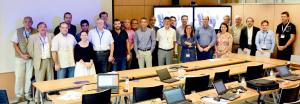Design of European Test Blanket Modules reviewed
20 Jul 2015
-
European Domestic Agency for ITER
The ITER Test Blanket Module (TBM) program has begun to transition from scientific research to nuclear engineering and realization. Conceptual design work is currently underway on all six Test Blanket Systems planned for testing on ITER.
Two European test breeding concepts: the Helium-Cooled Pebble-Bed (HCPB) and the Helium-Cooled Lead Lithium (HCLL) were reviewed during the Conceptual Design Review organized from 8 to 12 June 2015 by the European Domestic Agency and ITER Organization.
From 8 to 12 June, 30 experts came together in Barcelona to review the conceptual design of two TBM concepts put forward by Europe: the Helium-Cooled Pebble-Bed (HCPB) and the Helium-Cooled Lead Lithium (HCLL). (The key difference lies in the type of materials used for the tritium breeder.) By testing tritium concepts on ITER in a real fusion environment, scientists have a unique opportunity to explore the most promising techniques for tritium breeding that will be a critical technology for next-phase fusion devices.
See the original article on the European Domestic Agency website.
Under the leadership of the European Domestic Agency for ITER, Fusion for Energy, European companies IDOM, Atmostat, AMEC Foster Wheeler, Empresarios Agrupados, Assystem, Iberdrola, and European fusion laboratories KIT, CEA, ENEA, CIEMAT, UJV, KFKI, NRG have been collaborating extensively to push back R&D frontiers.
During the Conceptual Design Review organized jointly by Fusion for Energy and the ITER Organization, years of hard work and engineering reports exceeding 1,500 pages were examined. Participants focused on verifying that the requirements of the systems had been properly taken into account in the design, that risks had been taken into consideration and minimized, and that all boundaries of the system in ITER had been established and secured. For Yves Poitevin, Fusion for Energy's Project Manager for TBM systems, and his team, "this has been a turning point for the field because years of R&D work have taken shape and evolved into an engineering design that one day will be a system in ITER."
See the original article on the European Domestic Agency website.


